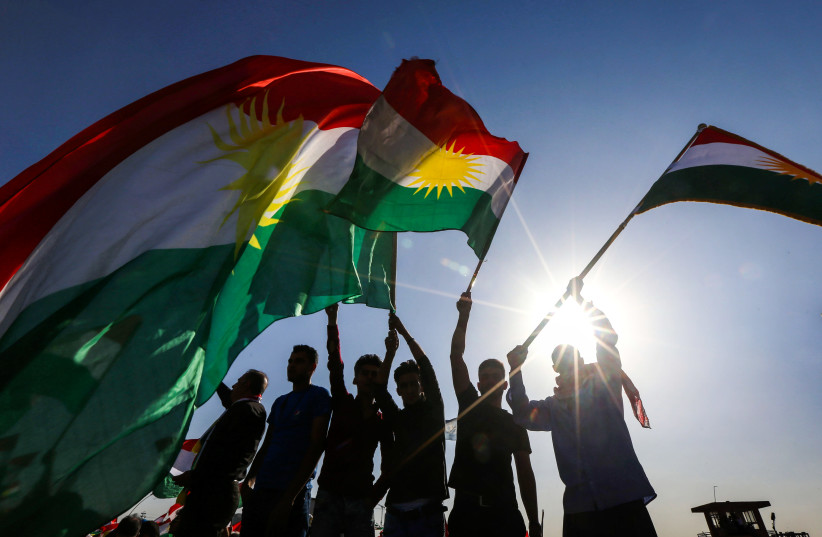by Seth J. Frantzman
It is interesting how quickly Iran, Turkey and also voices in Qatar have mobilized to single out Israel for critique regarding Syria.
 |
Iran and Turkey, as well as media and commentators linked to both countries, are seeking to condemn Israel for its recent bombing of Syrian military sites. They are also condemning Israel for its operations in a buffer zone on the Golan.
The IDF seized the buffer zone and the peak of Mount Hermon after the Syrian regime collapsed on December 8. The IDF has also struck various threats in Syria, such as warplanes and naval vessels so that they do not fall into the hands of enemies.
Why are Iran, Turkey and other countries and groups associated with them seeking to condemn Israel? They want to try to deflect from what is going on in Syria and their own role in the country. Iran has backed militias smuggling weapons in Syria and Turkey illegally occupies a large part of northern Syria. Turkey has carried out numerous airstrikes in northern Syria, targeting Kurdish groups. Turkish-backed militias have also filmed themselves kidnapping women and killing civilians.
These militias, part of the Turkish-backed Syrian National Army, have been murdering and kidnapping people in northern Syria for years, usually under the umbrella of protection by Turkish armed forces.
It is interesting how quickly Iran, Turkey and also voices in Qatar have mobilized to single out Israel for critique regarding Syria. They appear to be positioning themselves to back the new authorities in Damascus and they want to urge the new emerging Syrian government to condemn Israel.


How do the condemnations manifest themselves?
IRNA in Iran, a state media publication, ran numerous articles on December 10 slamming Israel. One article said that Hezbollah had “denounced” Israel’s “invasion” of the Golan Heights.
“The statement emphasized that the hostile invasion of Syrian territory, along with continued violations of the ceasefire in Lebanon and incursions into the Gaza Strip, present a significant threat to regional nations, highlighting the necessity for unity and collective condemnation of the aggressions,” the report said.
Iran condemned Israel officially. “Iranian Foreign Ministry Spokesman Esmail Baghaei Hamaneh strongly condemned the Zionist regime's repeated encroachment on Syrian infrastructure and the occupation of other parts of the Syrian Golan,” a second report said.
A third report said that “Zionist warplanes” had attacked Syria. The goal of these reports is to pressure the Syrian rebel groups who took over Damascus from Assad to condemn Israel. The goal of Iran and Turkey is to create tension. Doha, which backs Hamas, likely also wants to distract from Hamas crimes in Gaza. Doha recently hosted the Doha Forum where countries such as Iran, Turkey and Russia discussed the future of Syria. They understood Assad was finished, and now they want to angle to take advantage.
Turkey and Qatar
Meanwhile, Al-Arabiya also reported about Turkey slamming Israel. “The Turkish foreign ministry said on Tuesday that it strongly condemned Israel’s entry into the buffer zone between Israel and Syria and its advance into Syrian territory,” the report said. “Israel is once again displaying its occupation mentality,” Turkey’s foreign ministry said in a statement. Turkey is trying to become a power broker in Syria. Turkey invaded Afrin in northern Syria in 2018 and ethnically cleansed it of Kurds, moving militias into the area.
Later Turkey also invaded another area in Syria in 2019, effectively controlling around half of the border areas of northern Syria, including areas with hundreds of thousands of Syrians. When the Syrian rebels moved to oust Assad, Turkey ordered militias to attack the US-backed Syrian Democratic Forces, a mostly Kurdish group. Turkey has used the power vacuum in Syria to attack Kurds. Israel has expressed support for Kurds in Syria. Israel’s Foreign Minister Gideon Sa’ar posted a message on December 10 saying “the attacks on Kurds must stop.”
On December 9 Sa’ar said that in a briefing to foreign “I emphasized the importance of protecting minorities in Syria. The attacks on the Kurds, as we saw yesterday in Manbij, must stop! We are discussing this with our friends in the U.S. administration and other countries. The international community has a moral obligation toward those who fought bravely against ISIS and are also a stabilizing force in Syria.”


Qatar has also slammed Israel and it appears that many commentators who are linked to Doha are being mobilized to highlight Israel’s activity in Syria. “The State of Qatar strongly condemns the Israeli occupation's seizure of the buffer zone with the sisterly Syrian Arab Republic and the neighboring leadership sites, considering it a dangerous development and a blatant attack on Syria's sovereignty and unity, as well as a flagrant violation of international law,” Doha said on December 9.
The Ministry of Foreign Affairs of Qatar said that it “warns that the policy of imposing a fait accompli pursued by the Israeli occupation, including its attempts to occupy Syrian territories, will lead the region to further violence and tension. In this context, The Ministry stresses the need for the international community to assume its legal and moral responsibilities to compel the occupation to comply with international legitimacy resolutions, as well as to unite in confronting its opportunistic schemes.”
Seth J. Frantzman
Source: https://www.jpost.com/middle-east/article-832831
No comments:
Post a Comment